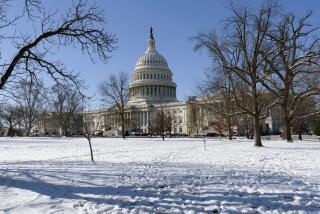The House : Perks for Ex-Presidents
- Share via
By a 356-61 vote, the House adopted an amendment to keep intact a wide range of perquisites for former presidents. The measure trimmed only $58,000 from a $1,234,000 outlay for ex-presidents in fiscal 1987.
Although appearing as budget cutting, this actually was a maneuver to block a proposed deep cut into the outlay for Richard M. Nixon, Gerald R. Ford, Jimmy Carter and Lady Bird Johnson, the former First Lady.
It gutted an amendment to reduce the expenditure by nearly $1 million, to $278,600, eliminating perks such as office space and staff support and leaving only $86,200 each in pensions for Carter, Ford and Nixon and $20,000 in pension money for Mrs. Johnson.
Both amendments were offered to an appropriations bill (HR 5294) that later was sent to the Senate.
Joe Skeen (R-N.M.), who sponsored the amendment to keep the perks intact, said that the former presidents, in an initiative led by Nixon, have pledged to hold down costs.
Andrew Jacobs Jr. (D-Ind.), who proposed the deep cut, called the outlay for ex-presidents “a slush fund” and said their pensions are higher than the income of 97% of Americans.
Members voting yes wanted to preserve taxpayer-provided perquisites for former presidents.
How They Voted Yea Nay No vote Rep. Dreier (R) x Rep. Martinez (D) x Rep. Moorhead (R) x Rep. Roybal (D) x Rep. Torres (D) x
Budget Cut
The House adopted 269-152 an amendment to cut $126.8 million from HR 5294 (above), the $13.8-billion Treasury and Postal Service appropriations bill for fiscal 1987. The cut was aimed at discretionary outlays, which account for nearly half of the bill’s price tag. But it was blunted because it exempted budgets for the Internal Revenue Service, Customs Service and Bureau of Alcohol, Firearms and Tobacco--all three of which generate revenue--and the Postal Service.
As passed and sent to the Senate, the bill was about $800 million above the Administration’s budget request and several hundred million dollars higher than than fiscal 1986 appropriations for the same agencies.
Members voting yes supported the spending cut.
How They Voted Yea Nay No vote Rep. Dreier (R) x Rep. Martinez (D) x Rep. Moorhead (R) x Rep. Roybal (D) x Rep. Torres (D) x
Textile Imports
With a 276-149 vote, the House failed to achieve the two-thirds majority needed to override President Reagan’s veto of legislation to protect certain American industries by sharply cutting imports of textiles, clothing and non-rubber footwear.
While the bill was aimed at many countries, most of them Asian, its strictest provisions sought to roll back textile and apparel imports from South Korea, Taiwan and Hong Kong by nearly a third.
This was a test of the Administration’s power to resist protectionist pressures in Congress at a time when imports are displacing many American workers. Democrats want to make trade an issue in the 1986 congressional elections.
Members voting yes favored the bill.
How They Voted Yea Nay No vote Rep. Dreier (R) x Rep. Martinez (D) x Rep. Moorhead (R) x Rep. Roybal (D) x Rep. Torres (D) x
More to Read
Get the L.A. Times Politics newsletter
Deeply reported insights into legislation, politics and policy from Sacramento, Washington and beyond. In your inbox three times per week.
You may occasionally receive promotional content from the Los Angeles Times.










